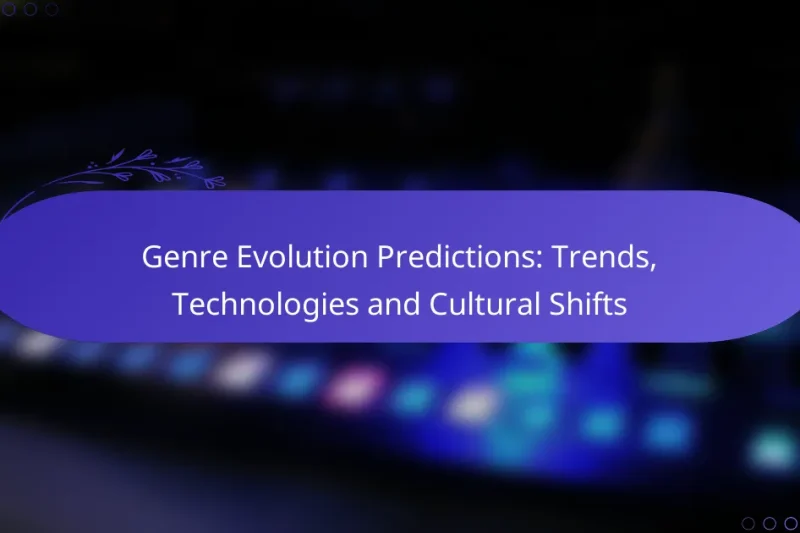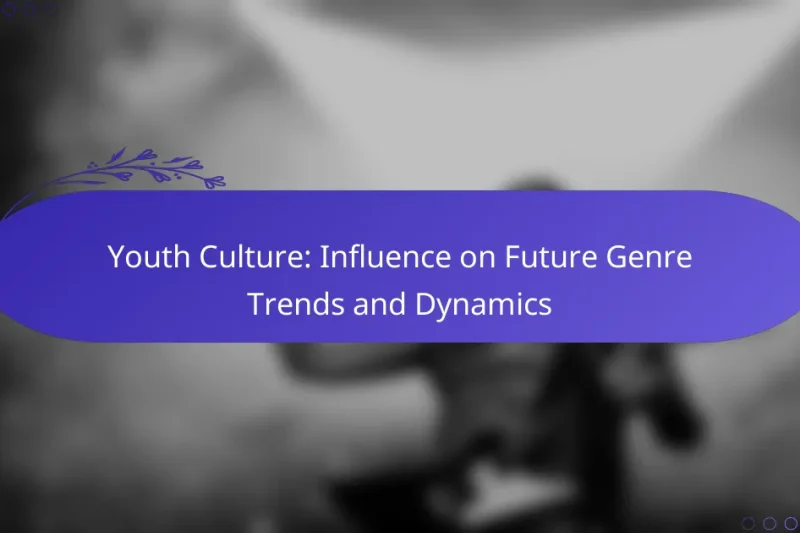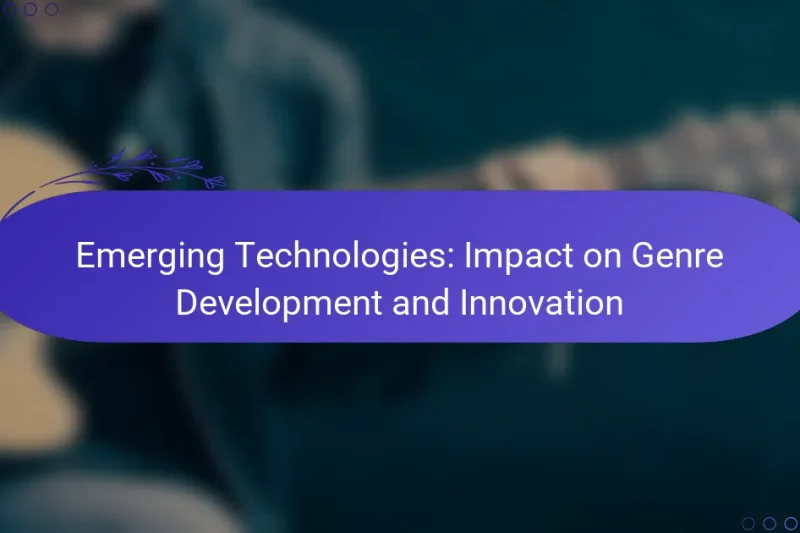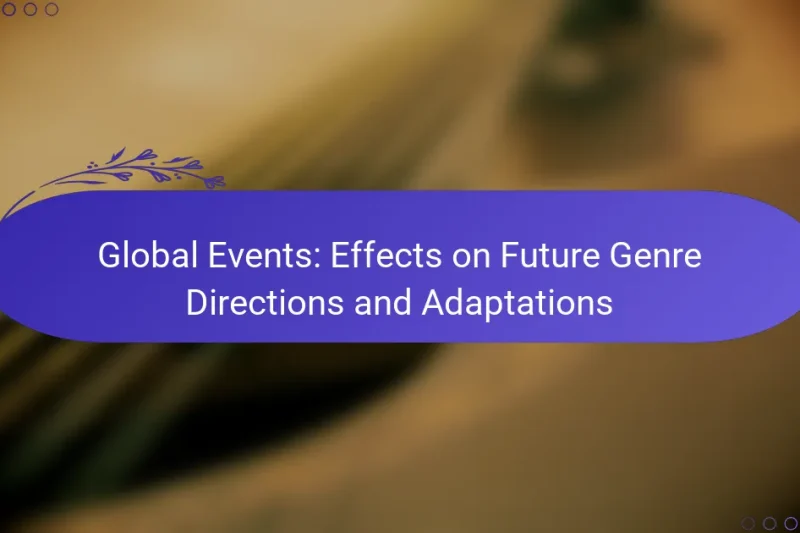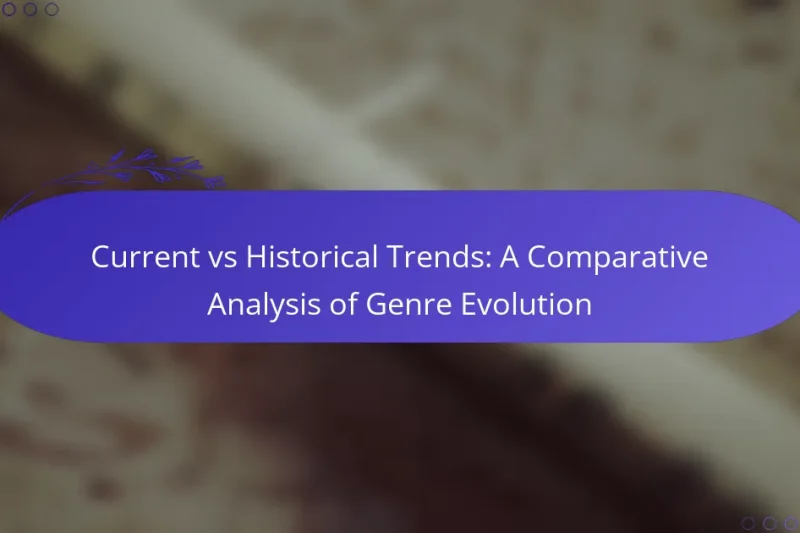The evolution of genres in media is being driven by a confluence of trends, technologies, and … Genre Evolution Predictions: Trends, Technologies and Cultural ShiftsRead more
Genre Evolution: Future Directions
The evolution of genres in music and film is increasingly driven by technological advancements and cultural shifts, paving the way for innovative artistic expressions. As artificial intelligence and digital platforms reshape production and distribution, we witness a rise in genre-blending styles and new storytelling forms that challenge traditional boundaries. This dynamic landscape not only alters audience expectations but also enhances engagement, creating a more diverse and immersive experience across both mediums.
Youth Culture: Influence on Future Genre Trends and Dynamics
Youth culture plays a pivotal role in shaping future genre trends across music, fashion, and social … Youth Culture: Influence on Future Genre Trends and DynamicsRead more
Emerging Technologies: Impact on Genre Development and Innovation
Emerging technologies are reshaping genre development in the entertainment industry by offering innovative ways for audiences … Emerging Technologies: Impact on Genre Development and InnovationRead more
Global Events: Effects on Future Genre Directions and Adaptations
Global events play a crucial role in shaping the direction of genre adaptations across various media, … Global Events: Effects on Future Genre Directions and AdaptationsRead more
Current vs Historical Trends: A Comparative Analysis of Genre Evolution
The evolution of music genres is a dynamic interplay between current trends and historical influences, each … Current vs Historical Trends: A Comparative Analysis of Genre EvolutionRead more
Sustainability Trends: Influence on Genre Evolution and Practices
Sustainability trends are reshaping artistic genres by prompting creators to integrate eco-friendly practices and themes into … Sustainability Trends: Influence on Genre Evolution and PracticesRead more
Cross-Genre Collaborations: Opportunities, Challenges and Innovations
Cross-genre collaborations present exciting opportunities for artists to merge diverse styles, expand their audiences, and push … Cross-Genre Collaborations: Opportunities, Challenges and InnovationsRead more
What are the future directions of genre evolution in music?
The future directions of genre evolution in music are shaped by technological advancements, cultural shifts, and innovative artistic expressions. Key trends include the integration of artificial intelligence in music production, the rise of genre-blending styles, and a growing emphasis on virtual reality experiences.
Integration of AI in music production
Artificial intelligence is transforming music production by automating tasks and enhancing creativity. AI tools can analyze vast amounts of data to suggest chord progressions, melodies, and even lyrics, allowing artists to experiment with new sounds and styles more efficiently.
For instance, platforms like Amper Music and AIVA enable musicians to create original compositions with minimal input. This integration not only speeds up the production process but also opens up possibilities for collaboration between human artists and AI, leading to unique musical outcomes.
Emergence of genre-blending styles
Genre-blending styles are becoming increasingly popular as artists draw inspiration from multiple musical traditions. This fusion creates innovative sounds that appeal to diverse audiences, breaking down traditional genre barriers.
Examples include the combination of hip-hop with country or the merging of electronic music with classical elements. Such experimentation encourages listeners to explore new musical landscapes and can lead to the creation of entirely new genres.
Increased focus on virtual reality experiences
Virtual reality (VR) is reshaping how audiences experience music, offering immersive environments that enhance live performances. Artists are leveraging VR technology to create interactive concerts where fans can engage with the music and visuals in unprecedented ways.
Platforms like Oculus Venues and Wave are pioneering this trend, allowing users to attend virtual concerts from the comfort of their homes. As VR technology becomes more accessible, it will likely play a significant role in the evolution of music experiences, making them more engaging and participatory.
How is genre evolution impacting the film industry?
Genre evolution is reshaping the film industry by blending traditional categories and introducing new storytelling forms. This transformation influences audience expectations, production strategies, and marketing approaches, ultimately leading to a more diverse cinematic landscape.
Rise of hybrid genres in cinema
The emergence of hybrid genres combines elements from different film categories, creating unique viewing experiences. Examples include romantic comedies that incorporate thriller elements or action films with strong dramatic narratives. This blending attracts broader audiences and encourages filmmakers to experiment with storytelling techniques.
As hybrid genres gain popularity, they challenge conventional marketing strategies. Filmmakers must consider how to effectively promote these films to audiences who may have specific genre preferences. Understanding the target demographic is crucial for successful outreach.
Influence of streaming platforms on genre popularity
Streaming platforms have significantly impacted genre popularity by providing vast libraries of content that cater to diverse tastes. Viewers can easily access niche genres that may not have thrived in traditional theaters, leading to increased demand for experimental and hybrid films.
Moreover, data analytics from streaming services help creators identify trends and audience preferences. This information allows filmmakers to tailor their projects to meet evolving viewer expectations, ensuring that they remain relevant in a competitive market.
What role does technology play in genre evolution?
Technology significantly influences genre evolution by enabling new sounds, distribution methods, and audience engagement strategies. Innovations in sound engineering and digital platforms reshape how music is created, shared, and experienced, often leading to the emergence of new genres.
Advancements in sound engineering
Advancements in sound engineering allow artists to experiment with a wider range of sounds and production techniques. Tools like digital audio workstations (DAWs), synthesizers, and plugins enable musicians to create unique textures and effects that can define new genres.
For example, the use of auto-tune has transformed genres such as hip-hop and pop, giving rise to a distinct vocal style. As sound engineering technology continues to evolve, artists can push creative boundaries, leading to the development of hybrid genres that blend various influences.
Use of blockchain for music distribution
Blockchain technology is revolutionizing music distribution by providing a decentralized platform for artists to share their work. This technology allows musicians to retain more control over their intellectual property and receive fair compensation directly from listeners, bypassing traditional intermediaries.
Platforms utilizing blockchain can facilitate transparent royalty payments and ensure that artists are paid promptly. As this technology gains traction, it may lead to new genre trends as independent artists explore innovative ways to distribute their music and connect with fans.
How are cultural shifts influencing genre changes?
Cultural shifts significantly influence genre changes by introducing new sounds, themes, and influences that reshape musical landscapes. As societies evolve, so do their musical expressions, leading to hybrid genres and innovative styles that reflect contemporary values and experiences.
Globalization of music styles
The globalization of music styles has led to a blending of genres from different cultures, creating unique fusions. For example, the incorporation of Afrobeat rhythms into pop music has gained popularity, resulting in a fresh sound that appeals to diverse audiences. This cross-pollination encourages artists to experiment and redefine traditional genres.
Artists can leverage global platforms to reach wider audiences, making it essential to stay informed about international trends. Collaborations across borders can enhance creativity and introduce new elements that resonate with listeners worldwide.
Social media’s impact on genre discovery
Social media has transformed how listeners discover and engage with music genres, allowing for rapid dissemination of new sounds. Platforms like TikTok and Instagram enable artists to showcase their work, often leading to viral trends that can redefine genre popularity overnight.
To effectively utilize social media for genre discovery, artists should engage with their audience through regular content updates and interactive posts. Understanding algorithms and leveraging hashtags can significantly enhance visibility and attract new fans, making it crucial for musicians to adapt to this evolving landscape.
What are the challenges faced by traditional genres?
Traditional genres are grappling with several challenges that threaten their relevance and sustainability. These include declining audience engagement and fierce competition from emerging genres that capture the attention of modern consumers.
Declining audience engagement
Many traditional genres are experiencing a drop in audience engagement as viewers and readers seek more interactive and immersive experiences. This shift often leads to lower viewership numbers and reduced participation in genre-specific events.
To combat this decline, creators should consider incorporating elements that foster community interaction, such as live events, social media engagement, or audience-driven content. For example, genres like reality TV have successfully adapted by involving viewers in voting processes or interactive storytelling.
Competition from emerging genres
Emerging genres, particularly those driven by technology and digital platforms, pose significant competition to traditional forms. Genres like streaming series, podcasts, and interactive gaming are attracting audiences with their innovative formats and flexibility.
Traditional genres must adapt by exploring cross-genre collaborations or integrating new technologies. For instance, a classic drama could incorporate elements of interactive storytelling to engage audiences more effectively. Staying attuned to trends and audience preferences is crucial for survival in this evolving landscape.
How can artists adapt to genre evolution?
Artists can adapt to genre evolution by staying flexible and open to new influences while actively engaging with their audience. This involves experimenting with different styles and collaborating with artists from various genres to create innovative sounds that resonate with listeners.
Embracing cross-genre collaborations
Cross-genre collaborations allow artists to blend different musical styles, creating unique sounds that appeal to a broader audience. For example, a pop artist might collaborate with a hip-hop producer to incorporate rhythmic elements that enhance their music’s appeal.
When pursuing collaborations, artists should consider their brand identity and how the partnership aligns with their artistic vision. Successful collaborations often involve mutual respect and a shared creative process, which can lead to exciting and unexpected results.
Utilizing data analytics for audience targeting
Data analytics can help artists understand their audience’s preferences and behaviors, enabling them to tailor their music and marketing strategies effectively. By analyzing streaming data, social media engagement, and demographic information, artists can identify trends and adjust their approach accordingly.
Artists should focus on key metrics such as listener demographics, engagement rates, and streaming patterns. This information can guide decisions on everything from song releases to promotional campaigns, ensuring that they connect with their target audience more effectively. Regularly reviewing data can help artists stay ahead of genre trends and audience shifts.
What are the emerging trends in genre evolution?
Emerging trends in genre evolution reflect a shift towards more personalized and diverse music experiences. As technology advances, listeners are increasingly seeking tailored content that resonates with their individual tastes and preferences.
Increased personalization in music consumption
Increased personalization in music consumption is driven by algorithms that analyze listener behavior to recommend songs and genres. Streaming platforms like Spotify and Apple Music utilize data to curate playlists that align with users’ unique musical preferences, enhancing the overall listening experience.
This trend encourages artists to experiment with genre-blending, creating hybrid styles that appeal to niche audiences. For example, a blend of hip-hop and classical elements can attract fans from both genres, leading to a broader reach and engagement.
To effectively leverage personalization, artists and labels should focus on understanding their audience’s preferences through analytics. Engaging with fans on social media and soliciting feedback can provide valuable insights into what resonates, allowing for more targeted releases and marketing strategies.
